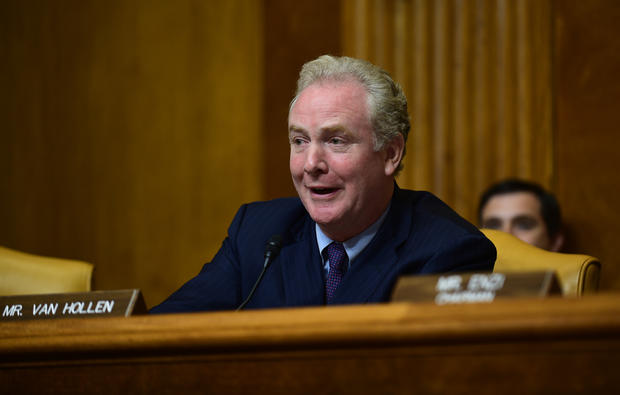Van Hollen, Beyer Propose Surtax On Millionaires
By DAN NOVAK, Capital News Service
WASHINGTON - The richest 1% of Americans control more wealth than the entire middle class combined, according to the Brookings Institution - a striking sign of income inequality that has accelerated since the Great Recession.
A bill introduced last week by Sen. Chris Van Hollen, D-Maryland, and Rep. Don Beyer, D-Virginia, aims to narrow the wealth gap by adding a surtax on millionaires.
Under the proposal, a 10% surtax would be levied on households that earn more than $2 million annually and on individuals that make more than $1 million. The tax would generate an estimated $635 billion in revenue over ten years, according to the nonpartisan Tax Policy Center.
"The point here is to ask the very wealthiest Americans to do more to invest in the success of the rest of the country," Van Hollen said in a Nov. 7 MSNBC interview. "Ninety-nine-point-eight percent of taxpayers will not pay an additional dime."
The tax would apply to all forms of income, including salaries, investment income and long-term capital gains, giving the measure a degree of comprehensiveness that Van Hollen said is essential to a successful tax on the wealthy.
"Right now very wealthy people make a lot money off their money and we don't see any reason why people who earn a paycheck should be penalized relative to them," he said.
Van Hollen's bill, which also is co-sponsored by Sen. Sherrod Brown, D-Ohio, comes amidst a slew of plans to tax the rich from 2020 Democratic presidential hopefuls.
Joe Biden, the former vice president and centrist frontrunner, has a plan to raise the income tax on capital gains from 20% to 39.6% for those earning more than $1 million annually.
Sens. Bernie Sanders, D-Vermont, and Elizabeth Warren, D-Massachusetts, have made their plans to radically alter the tax structure central tenets of their campaigns, billed as ways to pay for their ambitious social programs.
Warren would increase taxes on households earning $50 million or more, which is roughly 75,000 households, according to her campaign. The senator's plan is to tax each dollar of income above the $50 million threshold at 2%. Billionaires would pay an additional 3% tax.
"A thinner and thinner slice of the top has taken a massive amount of wealth while America's middle class has been hollowed out," Warren tweeted Tuesday. "We need a… big, structural change so that our economy and our government works for everyone."
Sanders's plan taxes the so-called "super rich" even more aggressively. He proposes a progressive tax structure, starting at 1% for earners with $32 million or more in income, and going up to 8% on incomes over $10 billion.
Sanders, a Democratic socialist, has stated bluntly that billionaires should not exist in the United States.
"We cannot afford to continue this level of wealth and income inequality and we cannot afford a billionaire class whose greed and corruption has been at war with the working families of this country for 45 years," he said in an October Democratic debate.
Economists Emmanuel Saez and Gabriel Zucman from the University of California-Berkeley, who helped the candidates draw up their plans, estimate that Warren's tax plan would generate $2.75 trillion over a decade, and Sanders's plan $4.35 trillion, though other leading economists have disputed those figures.
Depending on who is asked, higher taxes on the rich are either the solution to an ever-expanding wealth gap and a way to pay for a stronger social safety net or a strain on the economy that hampers growth and kills the motivation of individuals to become millionaires and billionaires.
"You're going to completely disincentivize capital investment, which is going to be very, very bad for economic growth," said Treasury Secretary Steven Mnuchin in a September interview with The New York Times. "Taxing capital is not a good thing for creating economic growth, and if anything we should be looking at how we create more incentives for economic growth."
According to an analysis by Saez and Zucman, if Warren's and Sanders's tax plans had been implemented in 1982, the combined wealth of the 15 richest Americans today would be cut by 54% and 79%, respectively.
Jeff Bezos, the wealthiest person in the world, is worth approximately $160 billion, but would be worth $86.8 billion today if Warren's tax plan were in place for the last 37 years. Under Sanders's plan, he would be worth $43 billion.
Skeptics of a wealth tax point to Europe, where several nations have abandoned a tax on extreme wealth. In 1990, 12 European countries had wealth taxes, but now it's down to four: Belgium, Norway, Spain and Switzerland.
Americans for Tax Reform, led by the highly influential conservative tax policy advocate Grover Norquist, called Warren's wealth tax, "a nightmare to administer, would double the size of the IRS, would fail to generate revenue that supporters claim, and has failed every time it has been tried in the past."
Saez and Zucman argued in a recent Washington Post op-ed that the failure of any tax is not the fault of the tax itself, but the fault of government to allow the tax to succeed.
"Governments can choose to make them work or allow them to fail, and European governments made wrong choices, letting tax avoidance fester," they wrote.
A poll by Politico and Morning Consult earlier this year found that more than three-quarters of Americans favor raising taxes on the rich.
The marginal tax rate for the wealthiest Americans reached 91% in 1944, according to the Tax Foundation, but has steadily declined since then. In 2017, the Republican-controlled Congress and White House cut taxes on the top earners by more than 2% to 37%, which will exacerbate income inequality, according to the Tax Policy Center.
"Trump's Tax Scam helped the rich and left workers behind," Van Hollen tweeted Nov. 7.
But his, or any other Democratic plan to raise taxes on the wealthiest Americans will require bipartisanship, at least as long as Republicans control the Senate.
The 2017 cuts led by President Donald Trump and former House Speaker Paul Ryan, R-Wisconsin, passed without a single Democratic vote.




